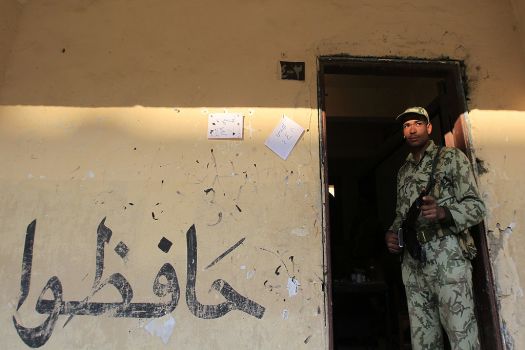
Perhaps the only way to explain the haphazard and self-destructive pattern of the SCAF’s decision-making over the past year is political amnesia: Having apparently forgotten the uproar over the military’s first attempt to influence the constitutional process, the SCAF is now on the verge of repeating one of its most dangerous mistakes.
As the 100-member constituent assembly chosen by the Islamist-dominated parliament implodes under the weight of a legitimacy crisis brought on by its underrepresentation of liberals, minorities and women, the SCAF is once again using the specter of impending chaos and instability as a pretext for intervening in the political process.
After the SCAF’s disastrous attempt to impose “supra-constitutional principles” codifying political privileges for the military in the new charter – a power grab that brought all major political forces and finally the Muslim Brotherhood back to Tahrir Square for mass demonstrations in November 2011 – it seemed that the military had been forced to back down from its efforts to exert influence over the new constitution. When the SCAF agreed to move up the date of the presidential election by several weeks to May 23-24, it appeared impossible that the military would succeed in pushing through a new constitution before a transfer of power to civilians – a timeline that the SCAF had previously lobbied for, in an attempt to hardwire the military’s political and economic privileges into the new legal framework before relinquishing executive power. However, the disintegration of a constituent assembly panned by virtually every non-Islamist political force as unrepresentative, has made the process vulnerable once again to manipulation by the SCAF.
The constitutional process and timeline are currently in jeopardy, with parliament forced to reformulate the 100-member assembly from scratch at its next joint session. At the same time, the SCAF is sending troubling signals that it plans to resume lobbying for the completion of the constitutional process before the presidential election – a proposal that seemed politically and logistically infeasible just a few weeks ago. In a meeting on April 15, the SCAF urged heads of political parties, including the Brotherhood, to finish writing the constitution before the election. But the obviously impracticality of that impossibly short timeline – requiring not only the selection of a new constituent assembly but the drafting of the document itself in less than five weeks – suggests that the SCAF would like the see the elections postponed altogether.
Fears that the SCAF will use the constitutional crisis as an excuse for delaying the electoral timeline are probably not unfounded. This would not be the first time the SCAF has tried to exploit political instability to prolong its control. Leading political figures are already speaking out against the possibility of postponed elections. The Freedom and Justice Party’s parliamentary council has urged both houses of parliament to agree on the formation of a new constituent assembly in their upcoming joint session, “so that the SCAF will not have a pretext for prolonging the transition period.” Former presidential candidate Mohamed ElBaradei – a longtime critic of military intervention in the legal framework – issued a strong statement on April 17 condemning the SCAF’s insistence on drafting a new constitution before the election. Meanwhile, socialist presidential candidate Hamdeen Sabbahi – one of the handful of “viable” candidates not disqualified by the Supreme Presidential Election Commission (SPEC) this week – said that the election should under no circumstances be postponed in order to resolve the crisis over the constituent assembly. “There is a binding date that has been announced for the handover of power to an elected president,” Sabbahi said.
With the Brotherhood already reeling from the disqualification of its presidential candidate Khairat al-Shater, would the SCAF risk inviting further fallout with Islamists over the military’s role in the new constitution? The last time the SCAF tried to manipulate the constitution, it brought the Brotherhood back to the streets – the only political force powerful enough to seriously challenge military rule. If the SCAF repeats this mistake again, the consequences could be even more explosive.
Mara Revkin is the assistant director of the Atlantic Council’s Rafik Hariri Center for the Middle East and editor of EgyptSource.
Photo Credit: Global Post
Image: egypt-military-scaf-parliament-constitution-12-08-11.jpg

